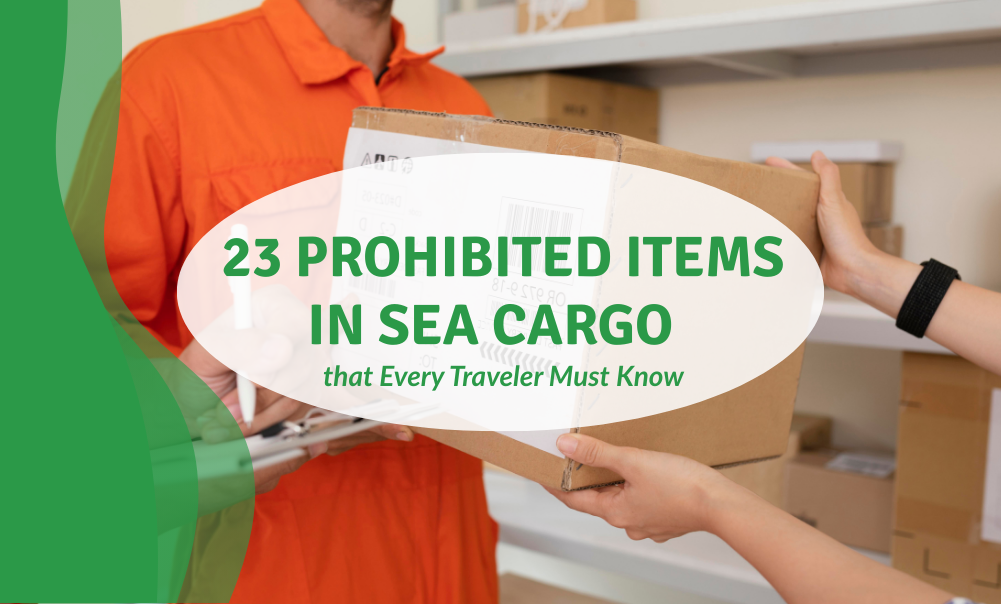Sea cargo is one of the most flexible ways to ship out goods. Although it is convenient, every shipping line limits its items for sea transport. Government regulations also dictate the prohibited items in sea cargo. Insufficient knowledge of prohibited goods might result in problems with shipment, and even conflict with the law.
You can avoid untimely complications by learning about the differences between the types of limited sea shipping goods. Read through this list of sea cargo prohibited items to be a responsible shipper.
Prohibited vs Regulated vs Restricted Sea Cargo Items
You might be confused whether an item is prohibited, regulated, or restricted for sea cargo shipping. These terms are defined by the Philippine Bureau of Customs (BOC) under the Customs Modernization Tariff Act of 2015 or RA 10863.
Regulated Items
These goods are subject to regulatory laws set by relevant government bodies, such as the Food and Drug Administration, Bureau of Plant Industry, Bureau of Animal Industry, and more. It is necessary to secure specific permits and clearances from these agencies before your item can be shipped.
Examples include plant, animal, and marine products, drugs or chemicals, used motor vehicles and electrical components, tobacco, and certain minerals.
Restricted Items
These are items that may only be shipped when a regulating agency or law explicitly authorizes an individual or business to do so. These are restricted for security reasons, as well as environmental and health safety.
Examples of restricted items for sea shipping are explosives and ammunition, lottery tickets, gambling-related machines and objects, and the like.
Prohibited Items
Otherwise known as contrabands, these items are considered unlawful for shipping. These are banned in any import or export activity, local or international shipments. No shipping clearances or permits allow the movement of prohibited goods in accordance with national law.
See the full CMTA terms as published by the Bureau of Customs here.
Your Guide to 23 Prohibited Items for Shipping via Sea
This list is further divided into six categories of forbidden items: Miscellaneous, Firearms, Dangerous Drugs and Substances, High-Value Items, Dangerous Goods, and Plants and Animals.
Miscellaneous Prohibited Items
-
Materials containing subversive acts against the government
Any written or printed goods that suggest, whether directly or indirectly, acts of rebellion, treason, or insurrection against the Philippine government are considered prohibited items for shipping. These are considered threats to national safety and security.
-
Pornographic materials
Media in written or printed form, as well as film, paintings, photos, and other types of objects that show graphic immoral acts and ideas are major prohibited items for shipping.
-
Mislabeled consumable goods
This kind of prohibited item violates food and drug regulations, making it unfit for human consumption. These may also contain harmful ingredients and materials.
-
Pirated goods
Pirated material is considered prohibited items in sea cargo due to violation of the Intellectual Property Code.
-
Gambling items
Most sea cargo lines do not accept gambling items such as cards, pinball machines, slot machines, and computerized games. In special cases, relevant government agencies only permit specific businesses or individuals to transport these items.
Prohibited Firearms
-
Realistic replicas or imitation firearms
Although they are replicas, imitation firearms are prohibited items in sea cargo because it can be used in a threatening approach, inciting fear in persons in presence of the item.
-
Disguised or improvised firearms
These types of firearms are prohibited as they can be used in crime and terror situations. Homemade and modified firearms are not regulated or registered with the relevant government agencies.
-
Stunning devices
Objects such as pepper or mace sprays, tear gas, and the like are considered as weapons and therefore are forbidden by government offices concerned with sea transport.
Dangerous Drugs and Substances
-
Illegal drugs
For many sensible reasons, illegal drugs are strictly prohibited items in sea cargo. Drug trafficking is a serious offense that can lead to numerous legal complications.
-
Drugs and paraphernalia used for abortion
As abortion is illegal in the Philippines, the government prohibits the shipment of materials, drugs, tools, and other items related to abortion. Any material that may directly or indirectly instruct an individual regarding abortion is strictly not allowed.
High-Value Items
-
Cash and items equivalent to monetary value
Cash, cheques, SIM cards, prepaid cards, and similar objects are prohibited items for shipping. Transporting these items is forbidden to prevent instances of money laundering and other criminal activity.
-
Improperly declared metals
Jewelries and other items that are manufactured with gold, silver, and other precious metals or metal alloys must be properly declared and labeled. Inaccurate and untruthful declarations of its fineness and quality are subject to relevant laws.
-
Products made from animal skins
Raw animal hide is perishable and susceptible to the accumulation of bacteria and decomposition. For safety reasons, products made from improperly preserved animal skin, or that of endangered animals, are forbidden on sea cargo.
Dangerous Goods
-
Explosives
Objects such as ammunition, firecrackers, and dynamite are prohibited items in sea cargo as they can generate small-scale to large explosions that endanger individuals.
-
Gases
Compressed gases, aerosols, and butane are examples of gases forbidden from shipping.
-
Flammable liquids
Shipping lines do not accept flammable liquids like kerosene, gasoline, lighters, or acetone for cargo shipping. These can cause fires and damage.
-
Flammable solids
Firecrackers, matches, and items that contain fuel are not allowed to be shipped due to threat to safety and its risk of fire.
-
Oxidizing substances
Chemicals like hydrogen peroxide, bromine, and ammonium are prohibited items for shipping. They can be found in household items used in bleaching and fertilizing.
-
Toxic and infectious substances
Substances like mercury, lead, and arsenic are harmful to the body. Exposure can cause health risks such as cancer, problems to circulatory, digestive, and nervous systems among others. Infectious substances carry the risk of spreading diseases.
-
Radioactive material
Items containing high levels of radiation can significantly affect individuals that are exposed to it. Certain radioactive laboratory materials are not accepted for cargo shipment.
-
Corrosive substances
This type of dangerous material includes acid fluid, batteries, paint and varnish thinner, which may cause irreversible effects when in contact with the eyes, skin, and vital organs.
Plants and Animals
-
Live animals
Live animals are forbidden on ordinary sea cargo. Shipment is only accepted on viable vessels when animals are kept in containers of suitable material, size, structure, and ventilation. In all special shipment procedures involving animals, individuals and businesses must exercise the protection of animal welfare.
-
Live plants, products, and seedlings
Plants that are intended to be exported or imported are prohibited items for sea cargo. Undocumented or smuggled plant shipments lack the proper clearances from regulatory agencies and risk introducing pests and agricultural diseases into their destination.
The above objects are prohibited items in sea cargo for safety reasons. To ensure the safety of all crew, handlers, passengers, and other individuals involved in the logistics process, it is best to avoid attempts of shipping sea cargo prohibited items at all costs.
ALSO READ: 8 Types of Shipments for RoRo Vessels
Looking forward to a hassle-free sea cargo shipping? SuperCat’s fast craft ferries cater to every budget and take you across South Luzon and Visayas. Talk to us to avail of our services today.


